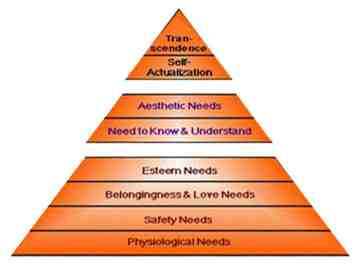CHOOSING
YOUR FOCUS
by
Amanda Knight
 |
Today's society measures our personal success by the lifestyle that we achieve ~ the size of our house, the cars in the drive, the amount of money we are paying into our personal pension each month, the school we send our kids to, our job title, how many package holidays we can afford each year But are we measuring ourselves accurately?
Many see material success as a demonstration of their 'self-actualisation' ~ the level of human development at which we achieve our potential. Yet when we consider where these 'successes' sit within Maslow's Theory of Human Motivation, it seems we have misinterpreted what research defines as human achievement.
Maslows
hierarchy of needs (see fig. 1) enables us to understand what motivates us as
human beings, with a focus on human potential, as he believed that humans
strive to reach the highest levels of their capabilities.
Some people reach higher levels of creativity, of consciousness and
wisdom. His term for these people
was "self-actualising".
|
|
In Toward
a Psychology of Being (1968), Maslow describes self-actualisation as:
" an episode, or a spurt in which the powers of the person come together in a particularly efficient and intensely enjoyable way, and in which he is more integrated and less split, more open for experience, more idiosyncratic, more perfectly expressive or spontaneous, or fully functioning, more creative, more humorous, more ego-transcending, more independent of his lower needs ... He becomes in these episodes more truly himself, more perfectly actualizing his potentialities, closer to the core of his Being, more fully human."
Self-actualisation,
then, is a state that we find ourselves in, rather than the attainment of
possessions and acclaim.
In
fact possessions and acclaim satisfy the lower needs of 'belonging', 'esteem'
and 'safety'. And our fight to
achieve these things means that we are neglecting our real 'growth' needs of
knowledge, peace, self-actualisation and self-transcendence.
This
fight is perpetuated by the prevailing values of the society in which we
exist.
Whereas 'safety' needs once would have been satisfied by our membership of a tribe or village community, now we are responsible for our own protection, in the form of home and financial security. We measure our level of safety by the adequacy of our home security, by the number of police officers on the streets, by the amount of protection offered by our insurance policies and our nest eggs.
Our
possessions add to the recognition that we receive from our families, our
neighbours, our work colleagues and our friends. That, combined with the desire to wear the right clothes, to
strive for the 'body beautiful', to be Mr Nice Guy, all serve to satisfy our
'esteem' needs
not our need to self-actualise, to 'be all that we can be'.
So, our need to achieve is more often driven by the need to survive ~ to satisfy our basic human needs ~ rather than by the higher human need within us to grow and evolve as an eminently intelligent being.
Redefining
success
But how do we move from the one paradigm to the other, and why should we even want to, particularly when our beliefs and values, and those of the people around us, are upheld by the measure of material success?
First we need to recognise that by measuring ourselves in this way, we are not in fact satisfying our higher human needs.
To
do this we need to:
·
understand exactly what is meant by our 'higher
needs'
·
recognise when we are meeting these, and how much
stronger and more motivated we become when this occurs
·
resolve to focus more on these newly identified
needs
·
gain a more balanced perspective about what our
basic needs actually are, and what we really need to meet them
·
become more emotionally intelligent about our
needs, so that we can satisfy all of them, not just the ones that we believe
are paramount
As we come to understand the differences between the two paradigms, we become aware of how we choose to think in any given moment. We can use Maslow's Hierarchy of Needs as a tool to help us raise this awareness, and to understand how our choices then create our experiences.
Maslow identified that our hierarchy of needs was like a pyramid, with all the basic needs at the bottom, and the needs concerned with man's highest potential at the top His research suggested that each level of the pyramid is dependent on the previous level. For example, a person does not feel the second need until the demands of the first have been satisfied.
However,
he had identified that we move up and down this pyramid at different times,
depending on our life situations. This
was further substantiated when Maslow was considering a new level of self-actualisation
~ self-transcendence ~ he observed this new state in people who had yet to
achieve the original level of self-actualisation:
"
I have recently found it more and more useful to differentiate between two
kinds (or better, degrees) of self-actualizing people, those who were clearly
healthy, but with little or no experiences of transcendence, and those in whom
transcendent experiencing was important and even central
It is unfortunate that I can no longer be theoretically neat at this
level. I find not only self-actualizing persons who transcend, but also
nonhealthy people, non-self-actualizers who have important transcendent
experiences. It seems to me that I have found some degree of transcendence in
many people other than self-actualizing ones as I have defined this term
"
This further reinforces that we can all experience being at different places on the Needs pyramid, at different times. So what causes us to move between these states? And is it really a linear process, up and down?
In my own work in people development I have come to use a very simple, but highly effective formula for helping people raise their performance, identified by the tennis coach Tim Gallwey:
Performance
= Potential
Interference
The
outcome (our performance) is dependent on our ability to be all that we can
be, which is inhibited by our headtalk or conditioning. This links in very well with the concept of spirit and ego,
or the conflict between our higher and lower selves. Maslow's hierarchy of needs also reflects this duality (see
fig. 2). His hierarchy is also
split into two parts ~ our 'deficiency' or basic needs, and our growth needs.
|
Basic needs |
Maslow's human motivations |
Growth needs |
|
Esteem needs: I must be successful; I want to be looked up to, admired |
Self-transcendence: Everyone can achieve their potential;
I want to help others discover how to self-actualise |
|
|
Belonging needs: I want to be popular; I don't want to be lonely or unloved |
Self-actualisation: The world is my oyster; I'll try
anything once! |
|
|
Safety needs: The world is a scary place; my home is my castle |
Experiencing
peace: I can transcend my fears; I trust
myself and my inner guidance |
|
|
Physiological needs: I need my creature comforts |
Quest for knowledge: I have a
sense of curiosity and wonder about the world and life |
|
|
Unmet basic
needs governed by the ego create emotional interference |
Unmet
trans-egoic or higher needs signify
untapped human potential |
Fig 2 Basic Needs versus Growth Needs
If any of the
emotionally-affected basic needs are not being met, this interferes with the
achievement of the growth needs. But
it does not mean that the growth needs are left unexplored or are not pursued.
It all depends on where our mind is focused at any moment.
The key to achieving our higher motivations, then, is to understand and be in control of our thoughts. Once we understand the motivation behind a specific thought, we can decide whether or not that motivation is still relevant, or if we would like to choose again.
Combining analysis of our human motivations through Maslow's hierarchy, with Emotional Intelligence profiling (EQ profiling), enables the individual to identify the areas of interference that are inhibiting his or her potential ~ ie. where his or her thoughts are underpinned by lower needs and motivations.
If
we return to Maslow's definition of self-actualisation in his book 'A
Psychology of Being', human success is about being "more integrated
more open for experience
more perfectly expressive
or spontaneous, or fully functioning, more creative, more humorous, more
ego-transcending, more independent of his lower needs
"
We all have these traits, but for many of us they are hidden or suppressed by conditioning and limiting beliefs, and the mindset of survival rather than growth. Yet once we allow ourselves to become more of these things, we will find that we will naturally attract the material successes that our lower needs depend on. In turn we will see that we have in fact achieved so much more than was in our original sights.
Used sensitively and with a clear perception, this process of personal assessment can stimulate a reawakening ~ a remembering that we are spiritual beings travelling in a physical body. This new way of seeing opens us up to the unlimited but latent potential and creativity that lies within each and every one of us.
[1] Abraham Maslow, The Farther Reaches of Human
Nature. New York, 1971.
![]()
Biodata:
Amanda
Knight is a Human Development Consultant with a passion for understanding the
potential and limitations of human performance.
She is a practising Emotional Intelligence (EI) consultant and trainer,
and has developed her own development framework called 'Intelligent
Performance'. Much of her work is
in collaboration with Activate, a development training company who run a
Centre of Excellence for outdoor experiential learning in the New Forest, on
the south coast of England.
Amanda can
be contacted via email at amanda@polarbear.fslife.co.uk or through the
Activate website at www.activate-training.co.uk.
